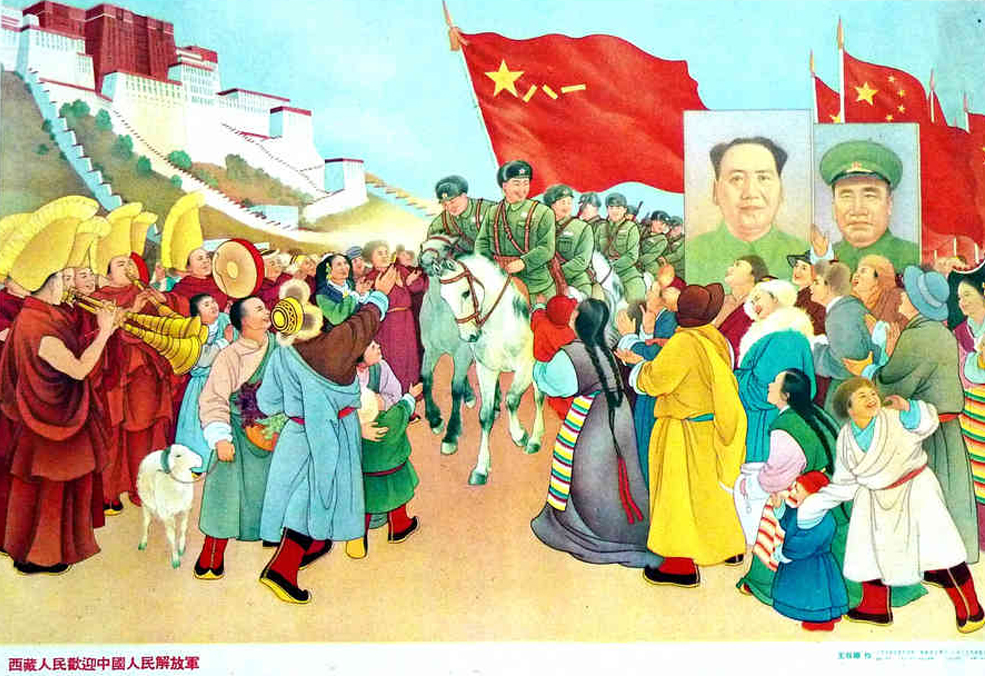
(TibetanReview.net, Dec30, 2014) – China had sought to improve what it said were largely negative mainstream foreign opinion about its record on Tibet not by taking steps to improve the situation there but through multiplicity of public relations exercises, including by sending delegations on expensive trips to hold and give talks, according to a commentary in its official Global Times newspaper Dec 28. However, the campaign has been a failure, the commentary admitted, but called for more such efforts.
Over the last few years China had sent Tibetan legislators, experts and cultural representatives abroad to share their views about their home, in addition to making documentary films and staging cultural activities in attempts to reverse this trend and win over supporters, said the commentary written by one Huang Jingjing.
It noted that a lot of criticism of China’s Tibet policies had come from the parliaments and congresses of Western countries, noting that currently there were more than 20 parliaments in Western countries where “Tibet question groups” had been established to assist “Tibet independence” forces to enlarge their international influence. To counter it, China had sent nine delegations of Tibetan legislators on overseas trips since 2009, following “the deadly March 14 riot in Lhasa which claimed 19 lives and injured hundreds of civilians and police officers.”
The commentary said the last delegation from the Tibet Autonomous Region, which included two deputies to China’s National People’s Congress (NPC), wrapped up an eight-day visit to five cities in Canada and the USA on Dec 7. It cited Tenzin Lhundrup, deputy secretary general of the Tibetan government and a member of the delegation that recently returned from the North America trip, as saying the parliaments where “Tibet question groups” had been set up “were the key targets of, as well as barriers to, our communication efforts.”
The other countries visited by delegations in previous trips included New Zealand, Australia, Belgium, Italy, the European Parliament, France, Spain, Poland and Latvia.
China sees the negative Western opinion about the situation in Tibet as a failure or a shortcoming in its propaganda efforts rather than as anything wrong with its policies and actions. The commentary cited Wang Pijun, former deputy director of the Tibet Bureau of the State Council Information Office (SCIO) of China, and currently the director of the information center of the United Front Work Department of the CPC Central Committee, as saying Tibet had long been described by an “ignorant” Western media as a region ruled over by the Chinese, who profit from its resources but damage its culture and environment.
“What we need to do now is go out and tell the world about Tibet, so as to increase understanding and dismiss confusion,” Wang was quoted as having told China Central Television in 2009.
However, the Western media’s complaint has not been that China does not say enough about Tibet but that it bars them from visiting Tibet on their own to see the real situation themselves.
The commentary was frank enough to cite “observers” as saying the public relations campaigns though important had limited effect. “I haven’t seen any reports in the Canadian media about the delegation’s recent visit to Canada,” it quoted Han Jiangxue (pseudonym), a Chinese reporter who has lived in Canada for more than four years, as saying.
On the other hand, the commentary said, as Chinese legislators were finishing their recent trip, the Dalai Lama set off from India’s Dharamsala to the Italian capital to attend the World Summit of Nobel Peace laureates, which received much more international media coverage than the legislators’ trip.
The commentary cited Han as saying the campaign involving the sending of delegations of Tibetan legislators had failed to make any changes, adding, “From the government to the media, reports about Tibet are all negative.”
Other kinds of campaigns carried out to improve China’s image on Tibet include the holding of the annual Tibetan Culture Week, jointly organized by the SCIO, the government of Tibet Autonomous Region and local Chinese embassies, in more than 12 countries and regions since 2001.
Also, Tibetologists had been sent on government-organized trips abroad every year since 2001, covering more than 25 countries that included the USA, Thailand, Japan, Australia, South Africa, Germany, Brazil and Sweden.
While participants in the trips have claimed success in their efforts, Han Jiangxue has said the government should evaluate the necessity of costly foreign trips if they show no effect.
Guo Kefan, a researcher at the Tibetan Academy of Social Sciences, has suggested that government officials should be more confident and relax the restrictions placed on overseas tourists that seek to enter Tibet.
The commentary cited Robert Barnett, Director of Modern Tibetan Studies at the Weatherhead East Asian Institute (WEAI), Columbia University, as saying he welcomed the Tibetans’ visits to the US but hoped that the exchanges could be two-way. “I have not been allowed a visa [to enter China] since 2007. I have never been given any reason for this. I am sure it is the result of a political decision, not because of any security concerns,” he was quoted as saying.
On the other hand, the commentary also quoted Tenzin Lhundrup as claiming, “Tibet is open. We have been welcoming foreign travelers and journalists to Tibet.” This is, unfortunately, manifestly not true. It has been a longstanding complaint of the foreign journalists’ club in China that Tibet continued to be closed to foreign journalists seeking to visit it on their own.



An important story yes, but whilst not seeking to be picky, your phrase – “Tibet independence” forces – is an inappropriate one for the world’s most peaceful people.